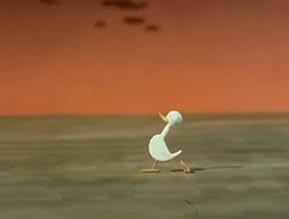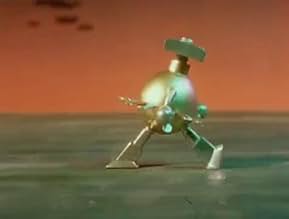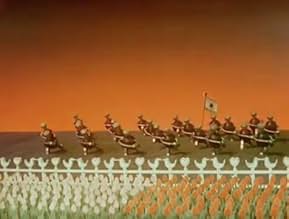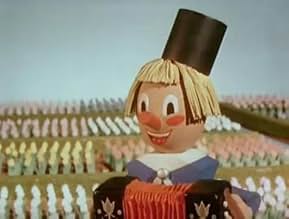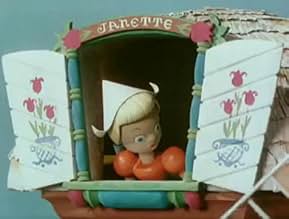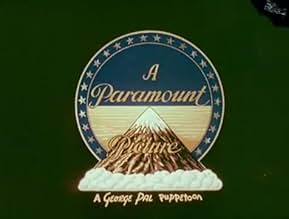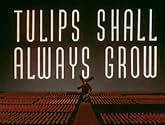Agrega una trama en tu idiomaA carefree boy and a young girl find their idyllic countryside invaded by an army of mindlessly destructive robots.A carefree boy and a young girl find their idyllic countryside invaded by an army of mindlessly destructive robots.A carefree boy and a young girl find their idyllic countryside invaded by an army of mindlessly destructive robots.
- Dirección
- Guionistas
- Nominado a 1 premio Óscar
- 1 premio ganado y 1 nominación en total
Opiniones destacadas
'Tulips Shall Grow (1942)' is a wartime 'Puppetoon' in which a young pair of lovers come under threat when an invading force of unfeeling machines starts to destroy their idyllic countryside home. The short starts out as a whimsical love story, its charming aesthetic enhancing its tried-and-tested romance. After a couple of minutes, though, it takes a hard left turn into all-out war. This sequence doesn't pull any punches; though no humans are shown to be harmed, the machines do absolutely devastate the environment and bomb every windmill in sight. The short is, in essence, an anti-war piece made in the midst of a very real war. It's not hard to see that the machines are an allegory for the Nazis and that the setting is meant to represent one of the European countries they invaded. The anti-war sentiment only really exists in the sense that we're shown how it decimates an innocent environment; it isn't any deeper than that. However, perhaps that's to be expected at a time when the war had to be won, rather than prevented. The picture is kind of unrealistic and, as such, it sort of trivialises the power of the opposing force. It's easy to see why it aims for overt optimism, though, and a message that ultimately says (as its title suggests) that peace and prosperity can in fact emerge from a war-torn world would've been incredibly pertinent at the time it was released. It's designed to tell the public that everything will be okay in the end. It's a little naïve in retrospect (after all, the filmmakers couldn't be sure the war would end in a favourable way), but it basically presents the right message at the right time if you view it in the context of its release. It's a solid effort. 6/10.
The story begins in Holland in happy times, until a bunch of fascist war machines come in and destroy everything. A boy and girl are in the middle of it and experience incredible sadness. The arrival of the awful machines is really the high point (though violent) as the devastate the country.
Filmmaker and puppeteer George Pal remains a severely underrated legend in the realm of fantasy filmmaking. His films have remained fairly unknown yet were still prominent accomplishments in their own right. While I haven't seen many of his Puppetoon series, Tulips Shall Grow stands out for its fascinating anti war commentary.
This might have some of the most haunting imagery I've ever seen in a seemingly cutesy wutesy fairy tale. Pal did not shy away from depicting just how deadly the affects of WWII were to the general public, especially with him being a native Hungarian.
Hard to say what would happen if this short won its Best Animated Short Oscar, but it's certainly easy to imagine how much of an impact it would've continued to have.
This might have some of the most haunting imagery I've ever seen in a seemingly cutesy wutesy fairy tale. Pal did not shy away from depicting just how deadly the affects of WWII were to the general public, especially with him being a native Hungarian.
Hard to say what would happen if this short won its Best Animated Short Oscar, but it's certainly easy to imagine how much of an impact it would've continued to have.
Before George Pal became famous for his sci-fi films of the 50s (such as "War of the Worlds" and "When Worlds Collide"), he established himself as a stop-motion animator. Using very small budgets and a lot of patience, he made some charming little films using wooden dolls. "Tulips Shall Grow" is one of these--and it's also a propaganda piece meant to bolster the war effort.
The film begins in happy Holland. Happy people doing happy stuff amid the happy tulips. However, soon the 'Screwballs' (made of screws and balls, actually) invade--an obvious allusion to the Nazis. Thing look bad for the happy people, tulips and windmills. However, because the Screwballs are idiots, eventually they destroyed themselves and left this merry land to the locals. It features VERY splashy sets and dolls and it's quite cute--perhaps too much for some. But very well made and worth seeing. My only reservation has nothing to do with the original film but the condition of the print I saw. It was very orange and lacked the original color. It obviously was in color but not any more.
The film begins in happy Holland. Happy people doing happy stuff amid the happy tulips. However, soon the 'Screwballs' (made of screws and balls, actually) invade--an obvious allusion to the Nazis. Thing look bad for the happy people, tulips and windmills. However, because the Screwballs are idiots, eventually they destroyed themselves and left this merry land to the locals. It features VERY splashy sets and dolls and it's quite cute--perhaps too much for some. But very well made and worth seeing. My only reservation has nothing to do with the original film but the condition of the print I saw. It was very orange and lacked the original color. It obviously was in color but not any more.
This cartoon is a masterpiece. While a lot of people think George Pal was a closed-minded racist because of his "Jasper" shorts, this short proves that he clearly wasn't. Like a lot of cartoons from this time period, it was anti-Nazi propaganda, but unlike a lot of cartoons, It actually focuses on the Holocaust, rather than just winning the war, like most WWII shorts. George Pal, living in Europe throughout the 1930s, experienced the Holocaust first-hand. He wasn't Jewish, but it still upset him to see the Nazis burn down buildings and kill Jews. So, when he came to America to make more films and escape the draft, he made this. Overall, it is a great cartoon. It can still be shown on T.V. today, because the "Nazis" are really robots called the screwballs. If your a teacher, you might even show it to your history class!
¿Sabías que…?
- TriviaIn 1997, the film was selected for preservation in the United States National Film Registry by the Library of Congress as being "culturally, historically, or aesthetically significant".
- ErroresWrong year in the wrong year.
- ConexionesFeatured in The Fantasy Film Worlds of George Pal (1986)
Selecciones populares
Inicia sesión para calificar y agrega a la lista de videos para obtener recomendaciones personalizadas
Detalles
- Fecha de lanzamiento
- País de origen
- Idioma
- También se conoce como
- Madcap Models No. U1-5: Tulips Shall Grow
- Productoras
- Ver más créditos de la compañía en IMDbPro
- Tiempo de ejecución7 minutos
- Relación de aspecto
- 1.37 : 1
Contribuir a esta página
Sugiere una edición o agrega el contenido que falta

Principales brechas de datos
By what name was Tulips Shall Grow (1942) officially released in India in English?
Responda
